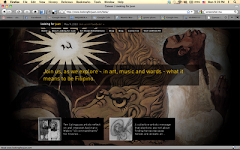We invite you to join a special edition of our Romeo Forbes Children’s Story Writing Competition, and, given the very special circumstances and challenges (especially for the artist), this one will come with
slightly different rules, and a higher cash prize - P70,000.00!!!
For the first time, the competition piece is a sculpture (shown above),
and artist Daniel de la Cruz will take on the challenge of rendering the
scenes of the winning story, also as sculptures! This will be a very special
and unique children’s book, even for CANVAS, and we are very excited to see what
stories you all come up with!
Rules and Conditions:
1. The Romeo Forbes Children's Storywriting Competition is
open to all Filipinos.
2. Entries must not have been previously published, and all
entrants must warrant the originality of their submitted entries.
3. Writers may submit only one entry, in English or
Filipino, which shall be of 1,200 words or less. This is a very strict limit on the number of words. Entries that exceed this limit shall automatically be disqualified from the competition.
4. There is no particular theme, other than the use of this
year's contest piece, a sculpture by artist Daniel de la Cruz, as the
inspiration or basis for the entry.
5. The main scene
depicted in the contest piece – that of the small boy reaching out to the fish
– must be part of your story. Note that there are two other smaller fish in the
scene – you may or may not include them in your story.
6. JUDGING PROCESS
A CANVAS review panel shall read and award points for all
stories received based on the following criteria:
* Imagery (45%)
* Quality of Writing (20%)
Based on the points received, CANVAS shall forward a
shortlist of at least five stories with the highest scores to the Artist.
The Artist shall select the winner from among the five
finalists.
6. Entries must be submitted by email, as a Microsoft Word
attachment, to storycontest@canvas.ph with the subject heading SPECIAL ROMEO
FORBES CHILDREN'S STORYWRITING COMPETITION.
Entrants must include a cover sheet with their name, mailing and email
address, and telephone number. Only the
story title should appear on all pages of the entry.
7. The deadline for submission of entries is 5:00 p.m.
(Manila time), Friday, 30 November 2012.
Entries received after the deadline, even if sent earlier, will no
longer be considered for the competition.
Kindly note that CANVAS acknowledges each and every entry
that we receive. If you submitted a story, and do not receive an
acknowledgement from us within 24 hours, please assume that your story was not
received and kindly resend it to us.
Nevertheless, entries received after the deadline, even if
sent earlier, will no longer be considered for the competition. CANVAS shall
not be responsible for entries which are not received, or which are received
after the deadline, due to technical failure or for any other reason
whatsoever.
8. All entrants hereby agree to authorize CANVAS to post
such entries on its website, as CANVAS deems fit, and free from any payments,
royalties or fees whatsoever.
 9. There shall be only one winner, who shall receive a cash
prize of PhP 70,000.00 (less applicable withholding tax) for his/her entry. The winner shall be responsible for all
applicable taxes.
9. There shall be only one winner, who shall receive a cash
prize of PhP 70,000.00 (less applicable withholding tax) for his/her entry. The winner shall be responsible for all
applicable taxes.
The winning writer shall also be entitled to five (5) free
copies upon publication of the book.
The winner shall grant and transfer to CANVAS all
intellectual property and publication rights to the story, including any
translations, adaptations or modifications thereto.
 It is hereby understood that the cash prize to be awarded to
the winner shall include consideration of such intellectual property and
publication rights to the story, and the writer shall not be entitled to any other royalties or fees from earnings, if any, that may result from future publication of, derivative works, licensing of, or other transactions on the same. (Please see our note below on why we have
this rule.)
It is hereby understood that the cash prize to be awarded to
the winner shall include consideration of such intellectual property and
publication rights to the story, and the writer shall not be entitled to any other royalties or fees from earnings, if any, that may result from future publication of, derivative works, licensing of, or other transactions on the same. (Please see our note below on why we have
this rule.)
10. Except for the right to publish any received entry on
its website, CANVAS shall not retain any other rights to entries that are not
selected as the winner, except where separate agreements are reached with the
writers.
 11. CANVAS shall exercise full and exclusive editorial and
artistic control over the publication of the winning entry and resulting
book.
11. CANVAS shall exercise full and exclusive editorial and
artistic control over the publication of the winning entry and resulting
book.
While, it is the full intention of CANVAS to publish the
winning entry as a full-color children's book, CANVAS reserves the right not to
publish the same for any reason whatsoever.
12. The winner of the CANVAS storywriting competition will
be announced on or around the first week of February 2013. The winner will also be notified via email on
the same announcement date.
13. CANVAS reserves the right not to award the top competition prize in the unlikely event that no entry is selected for the top prize. In such event, however, CANVAS shall have no right whatsoever over all entries that were received; and shall not publish any entry, in its website or in any other venue, without the prior written consent or agreement of the author.
14. The decision of CANVAS and Daniel de la Cruz shall be
final, and no correspondence or inquiries into the same - including requests
for comments/feedback on received entries - shall be entertained.
15. Employees of CANVAS, and members of their immediate
family, as well as the Artist’s immediate family, are disqualified from
participating in the competition.
Why We Ask for the
Transfer of Rights
The competition rules (Rule 9) clearly state that the
winning author should agree to transfer all rights to CANVAS and "...shall
not be entitled to any other royalties or fees from earnings, if any, that may
result from future publication of, derivative works, licensing of, or other
transactions on the same."
In case you were wondering, there are a number of reasons
for our imposing this rule:
First of all, having complete ownership of the story rights
makes it easier and less complicated for us to quickly and liberally share and
give our consent to anyone who may ask for permission to use the winning story
(something that we have always granted in the past).
It is for this very reason that the stories and
illustrations of books we publish are all available for public viewing and
enjoyment, and for free downloading as e-books on our website (www.canvas.ph), despite the concern of some
that the easy availability of the stories on the Internet could eat into the
sales of our books (which, happily, has not proven to be the case).
We have now taken it one step further. CANVAS now donates
thousands of our books to public schools, children’s hospitals and
disadvantaged communities throughout the Philippines by raising funds either
through grants or corporate sponsorships, and having complete ownership of the
titles will make it easier for us to reach our dream of eventually handing out
our millionth book. You can read more about this initiative here: http://www.globalgiving.org/projects/give-books-to-3000-children-in-the-philippines/updates/
A second reason why we ask for the transfer of rights is
that CANVAS is a small nonprofit, and is not equipped to document and track
royalty shares that ideally should accrue to authors and artists. In fact, we
only rely on and trust our partner publisher(s) to remit to us our own royalty
shares. It is for this reason that our prizes (we think), are quite substantial
and approximates (if not exceeds) what writers would normally expect to receive
in royalties.
Third, we are also trying to get the stories published
abroad. Should we get really lucky and end up on the NY Times Bestseller List, or somehow get endorsed by Oprah or Ellen, be assured that we will make things
right with the winning writer (you'll just have to trust us on this). But until then, having demonstrably complete
ownership over the rights, again, makes it easier and less complicated for us
to approach and negotiate with would-be publishers (who hopefully would not be
spooked by our giving out downloadable e-books for free in the first place).
Finally, we are also trying to be financially sustainable.
We rely on a small amount of grant funding to conduct our activities, including
co-sharing the publication costs of the books. We can only hope to recoup the
expenses so that we can do these activities on a continuing and recurring basis
in the years to come.
Please be assured of our continuing effort to balance our
desire to contribute to the public domain in a manner that is also fair to the
writers and artists, on the one hand; and our need to also be fiscally
responsible with the grants that have been entrusted to us, and to the
publishers and corporations that we partner with, on the other.






.jpeg)



